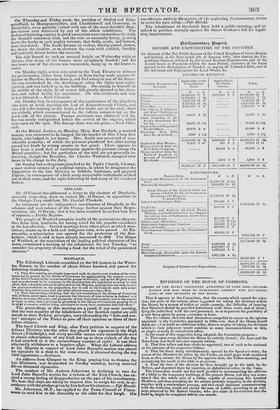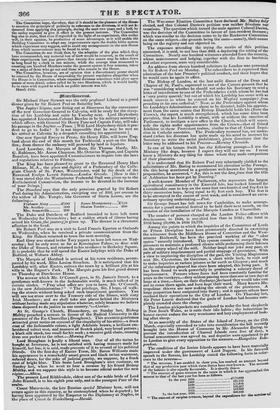DIVISIONS OF THE HOUSE OF COMMONS.
REPORT OF THE SELECT COMMITTEE APPOINTED TO TAKE INTO COYSIDE- RATION THE BEST MODE OF PUBLISHING CORRECT AND AUT•IENTZG LISTS OF THE DIVISIONS OF THE HOUSE.
That it appears to the Committee, that the reasons which caused the rejec- tion, last year, of the various plans s-osgested for taking the divisions within the House, by a system of tickets or cards—namely, the difficulty of insuring that Members should be provided beforehand with these cards, and of identi- fying the individual with the card presented, so as to prevent the possibility of a vote bring given by proxy—continue in force.
The Committee therefore find themselves compelled to concur in the opinion expressed by the Committee appointed in 1834—viz, that if the House should think prel:sr to build an additional lobby, there is no plan of taking the division, which in their judgment would combine so many recommendations as this, or might so easily be carried into effect. In the event of this suggestion being adopted, the Committee propose- ]. That upon every division the House be entirely cleared ; the Ayes and the Noes being sent forth into two separate lobbies. 2. That four tellers and four clerks be appointed, two of each to be stationed at the entrance of the respective lobbies. 3. That the doors being simultaneously opened by the Speaker's order, the names of the Members be taken by the Clerics, on ruled paper with numbered lines, as they reenter the House by the opposite door, the Tellers counting, and announcing the result at the table as at present. 4. That the lists of the division be then brought up to the table by the Tellers, and deposited there for insertion, in alphabetical order, in the Votes. The Committee would not feel itself justified in recommending the addition of a lobby to the temporary buildings of the present House, had they not ascer- tained that the whole cost of a lobby, capable of containing five hundred Members, and thus providing for the utmost probable inequality in the division, together with a commodious passage, and two small staircases communicating with the Galleries, would not exceed the sum of 1,5001., according to an esti- mate prepared by Sir Robert Smirke, who also states in his evidence that the build'ng might be completed within one month. The Committee hope, the-efore, that if it should be the pleasure of the House to sanction the ptinciple of publicity in reference to the division., it will not b." Ileterred from applying this principle, during the next two years and a half, by the outlay required to give it effect in the present instance. The Committee be also to state, that even if regarded in the light of an experiment, this outlay will, in their opinion, be productive of some advantages, as it will enable the Budding Committee to adopt any improvements upon the double lobby system which experience may suggest, and to avoid any arrangements in the new House from which inconvenience may be found to arise.
The Committee do not think that, by the adoption of the plan which they have recommended, any material lose of time would be incurred, as the result of their experiments last year proves that twenty-five names may be taken down Kt long hand by a clerk in one minute, while the average time consumed in counting one hundred Members under the present system is four minutes, taken ye a mean of those who go out and those who remain in the House.
The Committee, however, arc of opinion that a discretionary power should he retained by the House of suspending the present regulation altogether when the House is in Committee, where repeated divisions sometimes take place upon .peints of mere detail, unless called for by two Members, which it wouhl hardly be in cases with regard to which no public interest was felt.
March 1835.



























 Previous page
Previous page